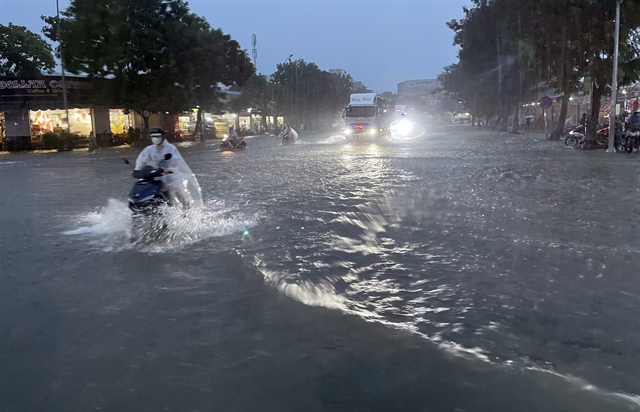 Society
Society


|
| Many roads in Liên Chiểu District, Đà Nẵng City are flooded due to continuous heavy rain. — VNA/VNS Photo Trần Lê Lâm |
HÀ NỘI — The low pressure system in the southwest sea of the Hoàng Sa (Paracel) Islands strengthened into a tropical depression on Tuesday morning.
The National Centre for Hydro-Meteorological Forecasting (NCHMF) said that from now until Thursday, the area from Quảng Trị Province to Quảng Nam Province would see severe heavy rain with accumulation of 100-250mm, in some places over 350mm.
Hà Tĩnh, Quảng Bình, Quảng Ngãi and Kon Tum provinces will have moderate rain, some places having heavy rain. Average accumulation will be 40-150mm, but in some places it will reach over 200mm.
From Thursday, northern and north central regions are likely to experience heavy rain.
People should be aware of the risk of flash floods, landslides in mountainous areas, and flooding of rice and agricultural crops in low-lying areas.
Disaster response work
The National Steering Committee for Natural Disaster Prevention and Control, Search and Rescue on Tuesday sent official dispatch 15/CĐ-QG to provinces, cities, concerned ministries and organisations to ask for urgent measures.
The committee requested agencies from Quảng Ninh to Khánh Hòa provinces to closely monitor the developments of the tropical depression that may strengthen into a storm.
They must strictly manage ships and boats working at sea, and notify vessel owners about the tropical depression’s movement to proactively avoid dangerous areas.
They must also set up warning signs in dangerous areas, prepare rescue forces and means to promptly handle any situation.
Inland areas from Hà Tĩnh to Quảng Ngãi provinces should closely monitor the developments of heavy rains, flash floods and landslides, and provide timely and complete information to authorities at all levels and people to know how to respond and minimise damage.
The provinces must deploy forces to inspect and review residential areas along rivers, streams, and low-lying areas to evacuate people to safe places.
Localities must assign forces ready to guide vehicles and set up warning signs, especially in flood-prone areas, spillways, deeply flooded areas, and fast-flowing water.
The forces are also responsible for fixing problems to ensure smooth movement of traffic on main routes when heavy rain occurs.
The provinces’ work includes keeping safety for key sea dikes or the ones under construction, preventing flooding in urban areas and industrial parks.
They should inspect the situation of reservoirs and downstream areas, especially small hydroelectric reservoirs and important irrigation lakes; and arrange permanent forces to be ready to handle any situations that may arise.
The Ministry of Natural Resources and Environment closely monitors and issues timely information on developments of the tropical depression.
The Ministry of Agriculture and Rural Development directs the work of managing fishing vessels and aquaculture, dykes, irrigation lakes and dams, especially key projects under construction.
The Ministry of Industry and Trade directs the work of hydroelectric dams and downstream areas, especially small hydroelectric plants. It must be ready to restore the electrical system in case of a problem.
The Ministry of Transport directs the work of ensuring transport safety, notably on main roads.
Other ministries, according to their assigned tasks, are ready to respond when bad situations occur. They must prepare forces and means for rescue when required.
The Vietnam News Agency, Việt Nam Television, Voice of Việt Nam and mass media agencies from central to local levels will increase information on developments of the tropical depression and heavy rains so that localities and people know to proactively respond.
All of the work must be regularly reported to the National Steering Committee for Natural Disaster Prevention and Control, Search and Rescue. — VNS




